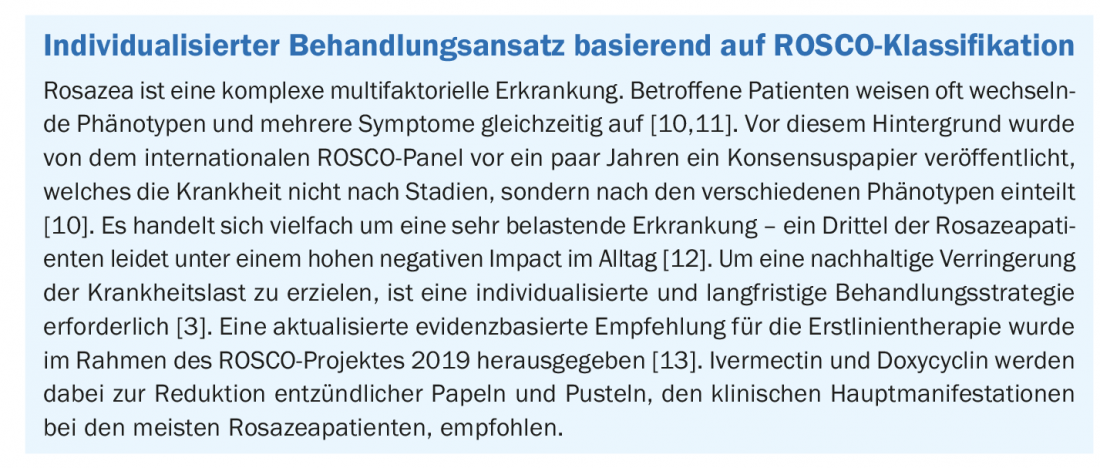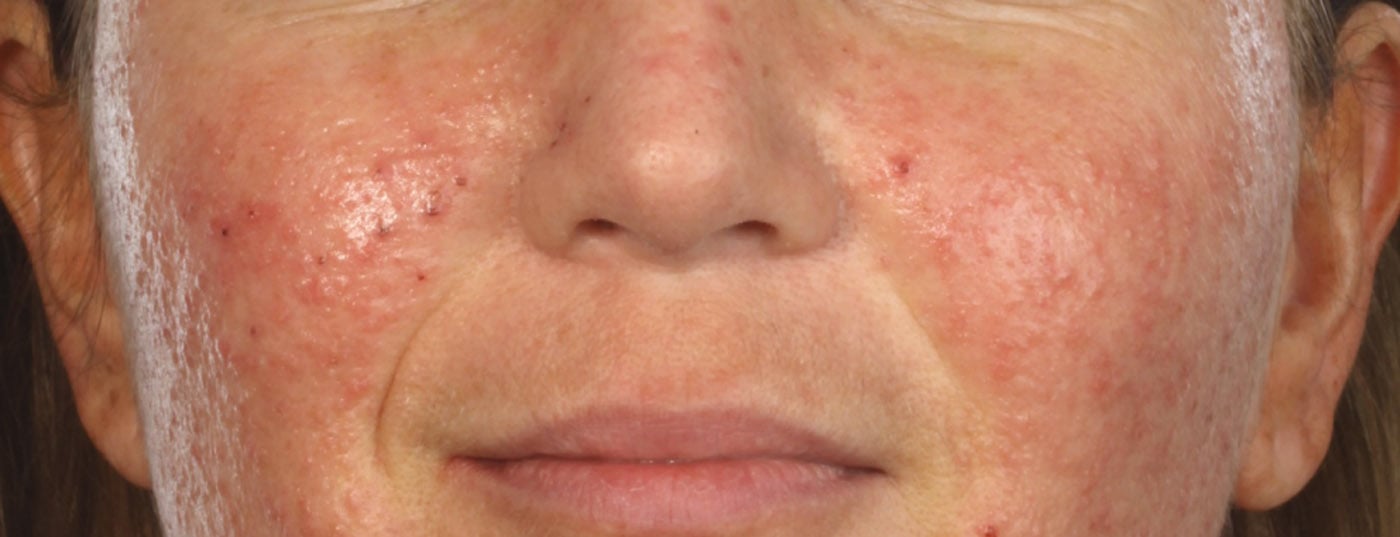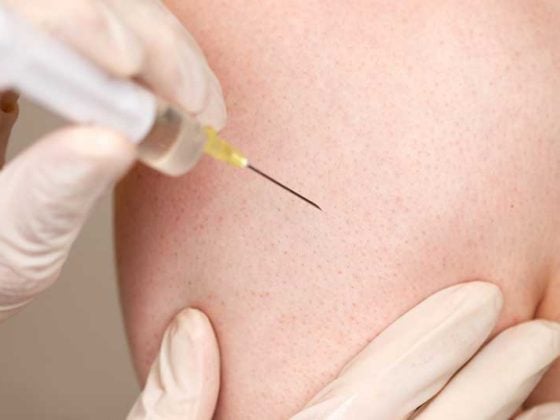Patients with moderate to severe rosacea are often subject to considerable suffering. In a phase III/IVb study, a combination treatment of ivermectin 1% cream plus oral doxycycline 40 mg resulted in visible improvement in skin appearance more rapidly than ivermectin monotherapy, with no additional safety signals.
The chronic inflammatory skin disease rosacea mainly affects centrofacial skin areas. Typical manifestations include erythema, papules, pustules, nodules, and telangiectasias on the face. Many patients have impaired self-esteem and some sufferers develop social phobia [1]. Effective treatment of skin symptoms can also alleviate these unpleasant side effects. The therapeutic goal is primarily restoration of the skin barrier and reduction of inflammatory processes and excessive sensitivity and dehydration of the skin [1].
Ivermectin cream (Soolantra®) is a well-established therapeutic option for rosacea and can be used as monotherapy or as part of a combination treatment regimen [2]. Ivermectin, a member of the avermectin group, suppresses the innate immune response, decreases Demodex mite density, and reduces the expression of cutaneous inflammatory biomarkers. Demodex mites in the hair follicle area are found in six times higher density in rosacea patients than in healthy individuals and are considered a possible cofactor in rosacea as they interact with the immune system and promote the inflammatory response [3].
The therapeutic effects of doxycycline (Oracea®) in rosacea are due in particular to anti-inflammatory effects of the antibiotic. Due to the modified release of the active ingredient, resistance does not develop. Doxycycline 40 mg has a good safety profile and is generally well tolerated [3,4].

Randomized trial in parallel group design
That the efficacy of ivermectin cream (Soolantra®) can be further increased by combined application with doxycycline (Oracea®) was shown in a randomized, multicenter, blinded phase III/IVb study by a research team led by Prof. Dr. med. Martin Schaller, University Dermatology Department, University of Tübingen (D) [1]. The empirical study, published in the Journal of the American Academy of Dermatology and presented at the EADV Annual Meeting last fall, is a valuable contribution to the rather limited evidence base on combination treatments for rosacea [1,5]. A total of 273 subjects over 18 years of age with severe rosacea were randomized 1:1 to receive either ivermectin 1% cream plus oral modified-release doxycycline or ivermectin 1% cream plus placebo over a 12-week period [1,5]. The included study participants had severe rosacea (IGA score=4) on the face with 20 to 70 inflammatory lesions (papules and pustules) and a maximum of 2 nodules. In addition to once-daily application of ivermectin plus doxycyline or ivermectin plus placebo, subjects were instructed to apply skin care products tailored to rosacea for baseline care during the study period.
Freedom from lesions as an achievable treatment goal
At week 12, the treatment arm with ivermectin plus doxycycline was shown to have a significantly higher proportion of subjects completely lesion-free compared with monotherapy (17.8% vs. 7.2%) [1,5]. The combination therapy proved to be more effective over the entire period in terms of percentage reduction in the number of lesions (80.3% vs. 73.6%) (Fig. 1) and in terms of improvement in skin condition as measured by IGA scores (p=0.032). Already at week 4, significantly more study participants achieved an IGA score of 0 under the combination of ivermectin plus doxycycline compared to ivermectin plus placebo (11.9% vs 5.1%) (Fig. 2). Regarding 100% lesion-free, the corresponding values were 17.8% vs 7.2%. Although more study participants overall were satisfied or very satisfied with combination therapy than with monotherapy (93.6% vs. 79.8%), the difference was not significant. Both treatment groups experienced improvements in erythema, stinging sensations, burning of the skin, and “flushing” and ocular manifestations. And in all study conditions, only a few adverse effects were reported.
Conclusion
On the one hand, the results confirm the good efficacy of ivermectin in patients with severe rosacea, but on the other hand, they indicate that the treatment effects can be further enhanced by a combination with doxycycline without negatively affecting the tolerability [1,5]. There was not a single treatment discontinuation in the study arm with the combination treatment. Another finding of this study is that careful basic care with appropriate skin care products helps to improve well-being in rosacea patients. A somewhat surprising result of this study was the improvement of symptoms in the eye area. Despite instructions not to apply ivermectin to the eye area, both treatment arms showed a reduction in symptoms such as dry, burning, red, or watery eyes. Also of note is the observed reduction in stinging or burning sensations demonstrated here and in previous clinical trials with ivermectin, as these symptoms can significantly increase patient discomfort [6–8]. What the study authors also point out is that the observed improvements in external appearance and quality of life may have contributed to reduced stress levels, which may have an additional positive effect, as increased levels of stress are considered a potential trigger factor in rosacea [9].
Congress: European Academy of Dermatology and Venereology
Literature:
- Schaller M, et al: A randomized phase 3b/4 study to evaluate concomitant use of topical ivermectin 1% cream and doxycycline 40-mg modified-release capsules, versus topical ivermectin 1% cream and placebo in the treatment of severe rosacea. J Am Acad Dermatol 2020; 82: 336-343.
- Drug Information: Soolantra®, www.swissmedicinfo.ch (last accessed Dec. 16, 2021)
- Eckert N: Rosacea: new therapeutic goal is complete freedom from manifestations. Dtsch Arztebl 2018; 115(41): A-1820.
- Drug Information: Oracea®, www.swissmedicinfo.ch, (last accessed Dec. 16, 2021).
- Schaller M, et al: A tailored skin care routine provides benefits to patients with severe rosacea under combination therapy with ivermectin 1% cream and doxycycline 40 mg or monotherapy with ivermectin and placebo. Abstract N°: 1171. EADV Annual Meeting, 29.9.-2.10.21
- Taieb A, et al: Superiority of ivermectin 1% cream over metronidazole 0.75% cream in treating inflammatory lesions of rosacea: a randomized, investigator-blinded trial. Br J Dermatol 2015; 172: 1103-1110.
- Taieb A, et al: Maintenance of remission following successful treatment of papulopustular rosacea with ivermectin 1% cream vs. metronidazole 0.75% cream: 36-week extension of the ATTRACT randomized study. J Eur Acad Dermatol Venereol 2016; 30: 829-836.
- Stein Gold L, et al: Efficacy and safety of ivermectin 1% cream in treatment of papulopustular rosacea: results of two randomized, double-blind, vehicle-controlled pivotal studies. J Drugs Dermatol 2014; 13: 316-323.
- Walsh RK, Endicott AA, Shinkai K: Diagnosis and treatment of rosacea fulminans: a comprehensive review. Am J Clin Dermatol. 2018; 19: 79-86
- Tan J, et al: Updating the diagnosis, classification and assessment of rosacea: recommendations from the global Rosacea COnsensus (ROSCO) panel. Br J Dermatol. 2017; 176(2): 431-438.
- SGDV, www.2020.sgdv-congress.ch/de/sponsoren/galderma, (last accessed Dec. 16, 2021).
- Rosacea: Beyond the visible, https://hosted.bmj.com/Rosazeabeyondthevisible (last accessed Dec. 16, 2021).
- Schaller M, et al: Recommendations for rosacea diagnosis, classification and management: update from the global Rosacea Consensus 2019 panel. British Journal of Dermatology 2020; 182(5): 1269-1276.
DERMATOLOGIE PRAXIS 2022; 32(1): 24-25
HAUSARZT PRAXIS 2022; 17(2): 31-32













